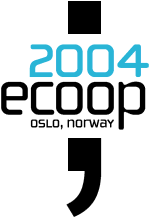

Web Services are evolving beyond their SOAP, WSDL, and UDDI roots toward being able to solve significant real-world integration problems. Developers of Web Services systems are currently working on new generations systems that incorporate security, transactions, orchestration and choreography, grid computing capabilities, business documents and processes, and simplified integration with existing middleware systems. Current economic issues continue to force consolidation and reduction in enterprise computing resources, which is resulting in developers discovering that Web Services can provide the foundation engineering and realisation of complex computing systems.
The first edition of the workshop was held in Darmstadt, as part of ECOOP 2003.
News and information on Web Services can be found at ![]()
The question of how Web Services could and should change system and solution development is very much open. Are Web Services just about standards, or do they imply a new conceptual framework for engineering and development? Similarly open is the question of how requirements coming from system and solution development could and should make Web Services evolve. In particular, methodologies as well as technologies based on the object-oriented conceptual framework are an established reality. How do Web Services and object-orientation relate? How can Web Services leverage the experience built into current object-oriented practices?
The overall theme of the workshop is the relation between Web Services and object orientation. Such relation can be explored from different perspectives, ranging from system modelling and engineering to system development, management, maintenance, and evolution. Aspects of particular interest are the modularisation of a system into components and the (possibly cross-domain) composition and orchestration of different modules. Components and composition are closely connected with the issue of reuse, and an important thread of discussion within the workshop will address the way in which Web Services impact reuse.
The objective of the workshop is twofold: assessing the current work on Web Services, and discussing lines of development and possible cooperation. Current work includes research activities as well as practical experiences. The assessment covers an analysis of driving factors and a retrospective on lessons learned. The identification and prioritisation of new lines of research and activity is a key outcome of the workshop. In particular, the intention is to foster future cooperation among the participants.
The workshop will be structured in three parts:
Presentation and discussion of individual contributions
Definition and discussion of future works and cooperation opportunities
Documentation of the workshop results and discussion on the dissemination plan
Participation is encouraged from both industry and academia. The number of participants is limited to 25-30 people, and precedence will be given to those who submitted contributions and/or early statements of interest.
Submission are welcome in any format (PDF and HTML preferable). As a reference: papers should be 2-5 pages long, slide sets should contain 8-12 slides, and demonstrations should be introduced by a 1-2 page description.
Selected contributions form the workshop will be published in the IBM Research Report series .
A report covering contributions to and discussions within the workshop will be published by Springer-Verlag in the ECOOP 2004 Workshop Reader.
Upon consent from the authors, all the contributions to the workshop will be made available in the Workshop web site.
5 April 2004 - Paper Submission
26 April 2004 - Acceptance Notification
20 May 2004 - Final Version of the Paper
14 June 2004 - Workshop
For any information please contact Giacomo Piccinelli at G.Piccinelli@CS.UCL.ac.uk.
The reference web site for the workshop is: http://www.cs.ucl.ac.uk/staff/g.piccinelli/eoows.htm
Anthony Finkelstein, Dept. of Computer Science, University College London, UK.
Winfried Lamersdorf, Dept. of Computer Science, University of Hamburg, Germany.
Frank Leymann, IBM Software Group Germany and University of Stuttgart, Germany.
Giacomo Piccinelli, Dept. of Computer Science, University College London, UK.
Sanjiva Weerawarana, IBM T. J. Watson Research Centre and University of Moratuwa, Sri Lanka.
Francisco Curbera, IBM T. J. Watson Research Centre, USA..